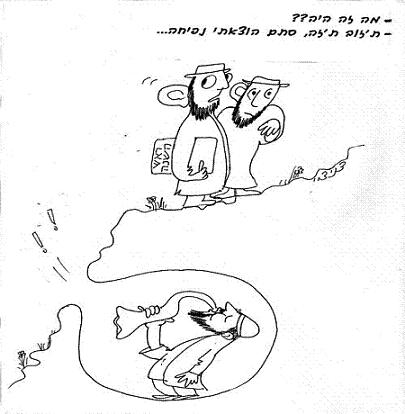
One Rosh Hashanah one is obligated to blow the shofar, for Chazal interpreted the Scriptural verses “a day of blowing the trumpets” (Numbers 29:1) and “a memorial of blowing of trumpets” (Leviticus 23:24) to mean the blowing of the shofar.
Mounds of specific laws have been discussed in the Talmud about the blowing of the shofar: how to blow, when, why, and what animal’s horn is suitable for a shofar. One of the discussions revolves around a person who blows the shofar within a well.
The early sages (Tanaaim), in their Halachic compilations (the mishnahs and the beraitas) wrote down Halachic determinations. In the Mishnah it is ruled that one who blows the shofar on Rosh Hashanah inside a well has fulfilled his obligation to sound the shofar. But if the sound which issues is the sound of the shofar mixed with the sound of the wind in the well [to such an extent that one standing outside the well thinks the sounds are one — Beit HaBechirah by the Meiri, Tractate Rosh Hashanah 27b] then he has not fulfilled his obligation to sound the shofar. Another sage, Rav Huna, added limitations to the written law and argued that people standing within the well when the shofar was sounded will always hear the sound of the shofar and not the mixture of the shofar and the wind. To support his argument he brought corroboration from a beraita (compilations of Halacha by the sages which were not included in the Mishnah), which rules that one who blows the shofar in a well has fulfilled his obligation, and no distinction is drawn between one who hears the shofar and one who hears this sound mixed with the sound of the wind. To keep the laws written in the Mishnah and in the beraita from contradicting each other we may say, Rav Huna argued, that those within the well always hear the sound of the shofar and not the mixed sound.
(The issues and discussions in the Talmud were oral and then edited in writing, and naturally they were not handed down accurately; there are often differing versions, as is the case here.)
Some of the scholars brought this discussion in a different version, raising the contradiction between the Mishnah and the beraita and having the sage Rav Huna reconcile them by drawing a distinction between those who hear from outside the well and those who hear it inside the well. Another sage, Rabbah, made another claim: one who hears the shofar within the well and, while still hearing it, leaves the well, though he should not fulfill his obligation while outside, does fulfill it, since when he started listening he was inside. On the other hand, one who hears the blowing of the shofar before the time set in Halacha (before daybreak) and continues hearing it on time (after daybreak) has not fulfilled his obligation to hear the shofar. One of the scholars, Abaye, asked what the difference is between the two laws. In both some of the blowing is properly done and some is not. Answer: One who blows before the proper time is doing something incorrect, but one who blows inside a well is doing something correct, though the person standing outside the well is not standing in the proper spot to hear it. The scholars went on to ask: Following Rabbah, one could conclude that one who hears only some of the blowing of the shofar has fulfilled his obligation to hear the blowing of the shofar. If so, why does the Mishnah rule that “One who hears the sound of the shofar mixed with the sound of the wind has not fulfilled his obligation”? Did he not first hear the sound of the shofar, before it was mixed with the sound of the wind? Answer: Rabbah never thought that only some of the shofar blasts exempts one from hearing all of them. If so, what did he mean? He said: A person who blows shofar in a well and continues to blow it while he exits the well has fulfilled his obligation. The scholars continued to ask: If so, if the sage Rabbah refers to the person who blows inside the well and continues to blow as he exits the well, it is clear that he has fulfilled his obligation (in both states his blowing was proper). Answer: The sage Rabbah made his ruling though it was obvious, lest other sages fear one who blows shofar in a well will leave the shofar in the well when his body is outside the well.
(Babylonian Talmud, Tractate Rosh Hashanah 27b-28a)
